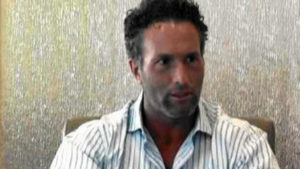From patient care, to testing, to pharmacy, we’ve got ‘em

Philip Esformes in a deposition in November 2011. (Court photo from video)
News out of South Florida this week proves once again that healthcare fraud, especially involving Medicare, remains one of the most pervasive and lucrative of frauds to commit. This week’s roundup includes a verdict in the fed’s largest healthcare fraud case ever brought and a big bust in yet another drug testing insurance fraud ring.
A federal jury last week convicted Miami Beach health care mogul Philip Esformes on 20 counts included paying kickbacks and bribes, money laundering, and obstruction of justice. Prosecutors say Esformes ran 30 nursing homes and assisted living facilities in South Florida that used a network of corrupt doctors and hospitals to refer thousands of patients to the facilities even though they did not qualify for services. Esformes and others also allegedly got kickbacks for steering patients to other health centers.
“Philip Esformes orchestrated one of the largest health care fraud schemes in U.S. history, defrauding Medicare and Medicaid to the tune of over a billion dollars,” Assistant Attorney General Brian Benczkowski said in a statement.
Deemed a flight risk, Esformes has been in jail since his 2016 arrest. He faces up to 250 years in prison at a future sentencing. He’s also been implicated in the current college admissions bribery scandal.
Up the road in Palm Beach County, the state attorney’s office announced last week the arrest of 15 people for their role in what’s described as a drug lab kickback scheme. They were arrested for patient brokering and conspiracy.
State Attorney Dave Aronberg, a former Florida legislator, said Coastal Laboratory of West Palm Beach billed $141 million in urine testing of recovering drug addicts from 2015 to 2017 and kicked back at least $6.2 million to 12 drug treatment centers in Florida and Pennsylvania that referred their patients.
“The Florida shuffle doesn’t end at the Florida border and certainly not at the Palm Beach County border. Today sends a message that labs that engage in kickback schemes will not be able to hide behind corporate walls to conceal unlawful activity,” Aronberg said.
Investigators say the lab performed extra, unnecessary tests on each urine sample so the owners could get more money from insurance companies. Anywhere from 30% to 50% of the money from each test was kicked back to the treatment centers, they say.
A Tampa area pharmacist has been sentenced to ten years in prison for his role in a $100 million pharmacy fraud scheme that spanned the lower half of Florida. Ademola Adebayo of Odessa, was the last of eight individuals sentenced in the scheme, and was also ordered to pay $3.2 million in restitution and $1.4 million in forfeiture, including Ferrari and Lamborghini cars.
Federal prosecutors say Adebayo and his co-conspirators defrauded private insurance companies, Medicare and TRICARE out of $121 million by submitting false and fraudulent claims for compounded drugs, primarily pain and scar creams, and other prescription medications that were not medically necessary, never provided, or both. The case was part of the Justice Department’s Medicare Fraud Strike Force prosecutions. Since beginning in 2007, the Strike Force has charged almost 4,000 defendants with fraudulent billing of more than $14 billion.
LMA Newsletter of 4-8-19

